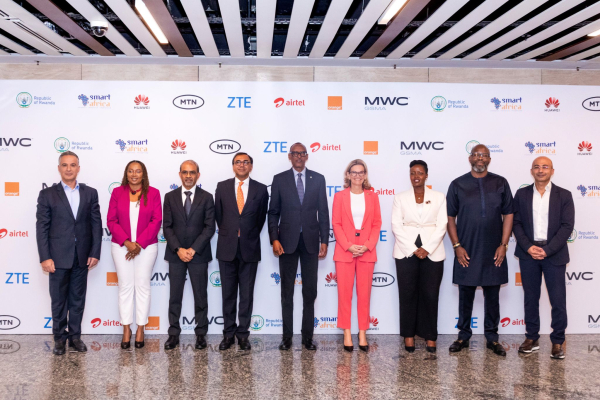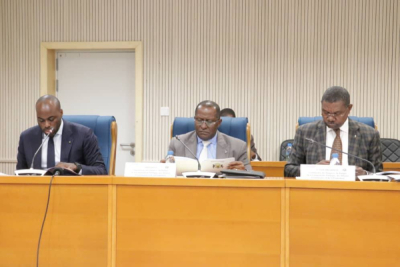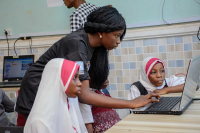- €12M EU funding pledged for Nigeria’s tech talent training
- Nigeria eyes digital leap, Denmark leads global e-governance ranks
Nigeria and Denmark have signed a Memorandum of Understanding (MoU) to deepen cooperation on digital infrastructure, artificial intelligence (AI), connectivity, and innovation.
The agreement was signed by Bosun Tijani, Nigeria’s Minister of Communications, Innovation and Digital Economy, and Lina Gandløse Hansen, Denmark’s State Secretary for Trade and Investment, during the fourth annual Nordic Nigeria Connect event held in Lagos on Tuesday, Oct. 21.
“We will work together to scale broadband infrastructure, pilot smart digital governance solutions, and facilitate pathways for Nigerian tech talent to contribute to Danish companies both remotely and in person,” Tijani said in a statement posted on X on Wednesday, Oct. 22.
He added that Denmark has pledged €12 million in funding, provided through the European Union, for Nigeria’s 3MTT program, which aims to train 3 million tech talents.
Tijani described the MoU as proof of Nigeria’s drive to build partnerships and tailor global best practices to local realities.
The move comes as Nigeria works to narrow its wide digital gap. Denmark tops the United Nations’ e-Government Development Index (EGDI), ranking first among 193 countries with a score of 0.9847, far above the global average of 0.6382. Nigeria is ranked 144th with a score of 0.4815.
Denmark also ranks in Tier 1 of the International Telecommunication Union’s (ITU) 2024 Global Cybersecurity Index (GCI), scoring a perfect 20/20 across all five assessment areas. Nigeria is classified in Tier 3, showing it must step up efforts in organization, capacity building, and cooperation.
The signing of the MoU marks progress after months of talks, but it does not yet guarantee effective cooperation. Neither side has given a timeline for a formal agreement or for implementing the deal.
Isaac K. Kassouwi
Over the past year, artificial intelligence (AI) and its transformative potential have captured global attention. AI's capacity to help achieve the 2030 Sustainable Development Goals (SDGs) is now well established. For Africa, fully embracing this technology has become an urgent necessity.
The GSMA, the global association for mobile operators, has partnered with six of Africa’s major mobile companies (Airtel, Axian Telecom, Ethio Telecom, MTN, Orange, and Vodacom) to launch an ambitious pan-African collaboration.
The initiative, dubbed "AI Language Models in Africa, By Africa, For Africa," was unveiled on Tuesday, Oct. 21, in Kigali, Rwanda, on the sidelines of the Mobile World Congress. Its mission is to develop inclusive language models designed for and by the continent, ensuring African languages, cultures, and knowledge are properly represented in the global digital future.
"Africa’s diversity of languages and cultures is one of our greatest strengths, yet it has too often been overlooked in the development of global AI systems," said Angela Wamola, Head of Africa at the GSMA. "This initiative is about turning that challenge into an opportunity – building African-led AI capacity, empowering innovation across local industries, and ensuring Africa shapes the digital future on its own terms. By working together, we can make AI more inclusive, more relevant, and more reflective of the world we live in."
Orange, which is ahead of the coalition on this issue, will play a decisive role. On Nov. 27, 2024, the French company signed a partnership with OpenAI and Meta to develop AI capable of recognizing and interacting with African languages. The results of that collaboration are expected to allow Orange to improve customer service in African vernacular languages, enhancing user experience, while also contributing to non-commercial projects in sectors like public health and education.
Addressing the Language Gap in Digital Technology
The coalition, which includes digital players, research labs, and innovative startups such as the African Population for Health Research Center (APHRC), Cassava Technologies, Masakhane African Languages Hub, The World Sandbox Alliance, Lelapa AI, Pawa AI, and Qhala, intends to close a critical gap in data, computing power, talent, and public policy.
The vast majority of today's dominant language models are trained on a limited number of "global" languages, leaving Africa's rich linguistic diversity, which comprises thousands of languages, severely underrepresented. This existing "AI language gap" marginalizes billions of potential users. Without adapted models, African populations cannot fully benefit from AI advances in essential areas like education, health, agriculture, or public services.
A growing proportion of the population is connected and uses mobile Internet, with smartphone penetration expected to reach 88% by 2030. While Africa accounts for only 2.5% of the global AI market, recent estimates suggest AI could boost the African economy by $2.9 trillion by 2030, equivalent to a 3% increase in annual gross domestic product growth.
A feasibility study conducted by the GSMA and its partners confirmed the technical and economic viability of locally designed language models. The key to success lies in coordinating efforts to prevent energy dispersion. The coalition will organize itself into thematic working groups, covering data, computing, talent, and policy, and will make its progress public at future GSMA events.
Beyond its symbolic value, the initiative represents a strategic imperative for the continent's development and digital sovereignty. Mastering the data, foundational models, and technical standards is crucial for reducing dependence on external platforms and technologies.
Crucially, models trained on African data will enable the development of applications rooted in local realities. This includes potential applications such as voice assistants that understand Wolof, Swahili, or Amharic, medical triage tools adapted to local contexts, contextualized educational content, or public service agents accessible to all, including in the most widely spoken languages. The GSMA noted that "in Africa alone, more than 2,000 languages are spoken, yet only a fraction are supported in digital systems or AI models. This lack of inclusion risks widening existing digital and economic divides."
Clear Strategy and a Call for Industry Cooperation
The alliance's strategy rests on four essential pillars, each presenting unique challenges. First, data involves collecting millions of words and phrases across African languages, strictly adhering to consent and anonymization rules, and including major languages, local dialects, and spoken language without favoring only cities or elites. Second, computing power for training these AIs requires pooling resources among partners to reduce costs and ensure information security. Third, talent requires training African AI experts and offering attractive careers to retain them on the continent and grow the new industry. Finally, governance requires governments to create a clear legal framework that encourages innovation and investment while protecting citizen data and ensuring the new technologies benefit everyone.
The expected effects are structured across three timeframes: short-term prototypes and region-specific benchmarks; medium-term concrete sectoral applications such as customer service bots and tools for creators; and long-term emergence of autonomous African AI capacity, capable of supporting local champions and enriching the entire ecosystem.
Identified prerequisites for success include transparent governance, funding beyond the prototype stage, strong technical interoperability to prevent isolated efforts, and absolute transparency regarding model performance and biases.
The coalition is issuing a formal call to the entire ecosystem, startups, universities, creative industries, civil society, donors, and major technology companies, to contribute to this collective effort through data, computing power, skills, use cases, or financial support.
Muriel EDJO
-
Gabon boosts 2026 digital budget by 156% to 82B CFA francs
-
Funds target infrastructure, literacy, and e-governance expansion
-
Country scores low in cybersecurity despite digital policy gains
Gabon’s Ministry of Digital Economy, Digitalization, and Innovation has announced a budget of 82 billion CFA francs for 2026, representing a massive 156.2% increase from the 32 billion CFA francs allocated in 2025. Minister Mark-Alexandre Doumba presented the budget to the National Transition Assembly on Sunday, Oct. 19, 2025.
The significant increase "reflects the government’s commitment to accelerating the country's digital transformation through the strengthening of the digital entrepreneurial ecosystem, the deployment of digital infrastructure, and the promotion of a genuine digital literacy across the country," the ministry said in a statement released on Tuesday, Oct. 21.
While the statement did not specify the projects planned for 2026, the government has launched several digital infrastructure initiatives in recent months. These include signing an agreement with an American technology company to construct a national data center. Private partners such as Cisco, Tech 41, Visa, Huawei, Moov Africa Gabon Telecom, and Afrastructure SAS have also been approached. Discussions have focused on expanding the national fiber optic network, strengthening universal service, telecom infrastructure sharing, 5G deployment, and connecting the country to a new submarine cable.
In digital transformation policy, the government recently issued an ordinance that mandates public administrations to digitize their services, interconnect their systems, and fully integrate the national private sector to establish digital sovereignty.
Gabon is currently ranked 121st out of 193 countries on the United Nations E-Government Development Index, scoring 0.5741 out of 1. This places it above the average for Central Africa (0.3354) and Africa (0.4247), but below the global average (0.6382). The country’s lowest score, 0.3188 out of 1, was recorded in the online services indicator, while its highest, 0.8263, was in the telecom infrastructure indicator.
This result aligns with the International Telecommunication Union’s (ITU) 2024 ICT Development Index, where Gabon scored 76.1 out of 100, ranking 11th out of 42 African nations.
However, Gabon faces challenges in cybersecurity. The ITU’s Global Cybersecurity Index 2024 placed the country in the fourth and second-to-last category (Tier 4), with an overall score of 39.86 out of 100. While the country achieved the maximum score of 20 in the legal measures pillar, significant progress is still required in the areas of technical, organizational, and cooperation measures.
Isaac K. Kassouwi
Smart data utilization has become a strategic imperative for organizations. The South African entrepreneur offers a technological solution that is redefining decision-making in the age of artificial intelligence.
Matimba Julian Nkuna, a South African entrepreneur and artificial intelligence specialist, is the founder and CEO of Timbuk2, a startup that develops custom AI-based data solutions.
Founded in 2023, Timbuk2 positions itself as a company specializing in enterprise-scale generative artificial intelligence solutions. Its primary offering is an Insights Engine, an analytics platform designed to extract and transform data into actionable strategic information. The goal is to help businesses guide their decisions using relevant analyses tailored to their operational needs.
Timbuk2 targets organizations seeking to base their strategic choices on data. The firm provides large-scale market analyses and offers decision-making support. Its solutions are designed for professional use and produce measurable, directly applicable results.
Before Timbuk2, Nkuna founded Bantubyte in 2020, a startup specializing in artificial intelligence, data science, and the development of digital solutions for African and international companies. That initiative addressed the data science skills gap on the continent by combining advanced technologies with an understanding of the local context.
His first venture, Grikwa, founded in 2012, was an online notice board platform for universities. Nkuna holds a bachelor's degree in Geomatics and a master's degree in Computer Science from the University of Cape Town. He began his career between 2012 and 2015 as a trainee geospatial analyst at South Africa's National Geo-Spatial Information.
In 2016, he joined the retail group Pick n Pay as a research scientist. Two years later, he became a data scientist at Sensor Networks, a startup specializing in smart technology for home energy and risk management. In 2019, he moved to the e-commerce sector as a data scientist at Takealot.com before joining The Shoprite Group of Companies between 2021 and 2023, where he served successively as a data scientist and then a technical product manager.
Melchior Koba
He has established himself as a key player in South Africa's job market. His initiatives show how technology can reshape the connection between employers and candidates for entry-level positions.
Christiaan van den Berg, a South African entrepreneur and chartered accountant, is the co-founder of Jobjack, an online recruitment platform established in 2018. Jobjack focuses on hiring for entry-level positions, aiming to simplify the recruitment process for both employers and job seekers, particularly in high-turnover sectors such as retail, hospitality, logistics, and manufacturing.
Job seekers can apply for multiple offers without incurring any fees or travel costs. They create an online profile, complete psychometric assessments, and navigate an entirely digital application process. Once selected, candidates receive interview notifications and can accept job offers directly through the platform.
Jobjack operates as an automated Software as a Service, or SaaS, solution that significantly reduces recruitment time and administrative tasks for employers. It integrates validated psychometric assessments, credit and risk checks, and screening tools based on location and job requirements. These features allow employers to quickly identify candidates who match their specific needs.
Since its inception, Jobjack has helped more than 30,000 people in South Africa find employment. The company has received multiple accolades, including the National Technology Award at the South African Small Business Awards in 2021, the Future of Work 2023 prize at the Startup Club ZA Awards, and the Youth Entrepreneur award at the South African Future Trust Awards in 2024.
Van den Berg is also the co-founder and director of Harris Berg, a company established in 2014 that specializes in the retail of clothing and fashion accessories in South Africa. He graduated from Stellenbosch University in 2015 with a bachelor's degree in accounting.
Melchior Koba
- Lomé-based startup Edolé has connected over 5,000 users and 500 workers, completing more than 60 projects since its 2020 launch.
- The platform enables construction firms to book workers, equipment, and quotes online, reducing administrative burdens and project delays.
- Edolé plans to expand its services beyond Togo into West Africa as part of a regional growth strategy.
In Togo, a young tech startup is aiming to revolutionize the construction and public works (BTP) sector by combining skilled labor, equipment, and technical support through a digital platform.
Founded in 2020 by Kodjo Aïd Otou, Edolé provides an online and mobile solution that allows contractors to book workers, rent machinery, or request quotes in just a few clicks. The system evaluates and categorizes resources before making them available to users.
For contractors, construction companies, and individual clients, Edolé reduces project delays, improves resource management, and removes administrative bottlenecks.
The company describes itself as a “digital bridge” connecting labor and equipment supply with project demand in a market still largely informal.
“Between entrepreneurs seeking reliable workers, underemployed artisans, and idle equipment, Africa’s construction industry lacked a strong bridge between supply and demand. We built that bridge,” the company states on its platform.
Edolé says it has already deployed thousands of workers and machines via its platform and aims to extend its services beyond Togo into the West African subregion.
The startup claims over 5,000 users, more than 500 workers, and over 8,000 direct and indirect jobs created, alongside 60 completed projects. Its mobile application is available on iOS and Android, with more than 1,000 downloads on the Play Store.
Edolé’s trajectory aligns with Africa’s broader digital shift in the construction industry. By digitizing access to skilled labor and machinery, the company contributes to professionalizing a key economic sector and stimulating employment in the region.
This article was initially published in French by Adoni Conrad Quenum
Adapted in English by Ange Jason Quenum
- Algeria has mobilized $1 billion to finance African startups and young innovators under a new continental fund launched by President Abdelmadjid Tebboune.
- The initiative aims to boost innovation in strategic sectors including technology, education, health, and humanitarian aid.
- The move comes as African startup funding dropped from $6.5 billion in 2022 to $3.2 billion in 2024, underscoring the need for sustainable, homegrown financing.
Algeria has committed $1 billion to support African startups as part of its effort to stimulate innovation and strengthen regional economic integration, the country’s Minister of Foreign Trade and Export Promotion, Kamel Rezig, said on October 21.
The funding, part of the African Startup and Young Innovators Financing Fund launched in September by President Abdelmadjid Tebboune, targets projects with high social and economic impact across the continent.
Rezig said the fund will “back entrepreneurs working in priority areas such as technology, education, healthcare, and humanitarian services” to foster African creativity and expand intra-continental trade.
The announcement comes amid a sharp decline in startup financing across Africa. Data from Partech Africa show that funding fell from a record $6.5 billion in 2022 to $3.5 billion in 2023, and stabilized at about $3.2 billion in 2024.
Despite the slowdown, the continent’s tech sector has remained resilient, prompting governments and investors to develop more sustainable, locally anchored financial mechanisms.
Domestically, Algeria has built momentum in entrepreneurship. Government data show that by mid-2025 the country hosted 1,600 microenterprises, 130 startups, 1,175 projects labeled “innovative,” and 2,800 registered patents. Authorities aim to grow the number of startups to 20,000 by 2029.
Entities such as Algeria Venture and the National Startup Fund have been instrumental in mentoring entrepreneurs, facilitating access to capital, and connecting innovators with regional networks.
Officials said the continental fund will strengthen collaboration among Algerian and African entrepreneurs in key industries such as fintech, agritech, digital health, and renewable energy.
Over time, the initiative is expected to help structure an integrated African innovation ecosystem capable of generating skilled jobs, accelerating digital transformation, and improving the continent’s economic resilience.
This article was initially published in French by Samira Njoya
Adapted in English by Ange Jason Quenum
- OneNine, founded by Senegalese entrepreneur Doudou Ba and Czech-Vietnamese engineer Duc Anh Tran, is building an AI infrastructure focused on African languages.
- The startup already works with over 160 native contributors and several data companies on pilot projects launched in August 2025.
- OneNine plans to process more than 500,000 hours of linguistic data to position itself as a global leader in underrepresented language datasets.
OneNine, a Sweden-based startup co-founded by Senegalese entrepreneur Doudou Ba and Czech-Vietnamese engineer Duc Anh Tran, is developing an artificial intelligence platform that understands and communicates in African languages.
The company emerged from a key observation: most AI systems are trained on dominant languages such as English, French, or Chinese, overlooking hundreds of languages spoken by millions across Africa. OneNine seeks to bridge this gap by collecting, sorting, annotating, and validating voice and text data in native African tongues.
#OneNine is the Data Supply Chain for AI.
— Doudou BA (@doudou_onenine) October 23, 2025
We provide production ready dataset to AI labs like @OpenAI @Meta @Google @AnthropicAI @xai @netflix @YouTube saving them 70-80 % FTE.
We are highly specialized in low resource languages and mission to make AI understand everyone.… pic.twitter.com/FxVt4aUHqN
Launched in August 2025, OneNine’s platform relies on a network of more than 160 African language contributors, supported by automated data-processing tools. The company has already initiated pilot projects with several linguistic data and research firms.
“Many people cannot read or write, but they can speak — maybe not in English, but in their mother tongue. We want AI to hear them,” said co-founder Doudou Ba.
Ba emphasized that Africa has a crucial role in shaping the future of AI. “The next frontier of AI will not depend solely on building more powerful models, but on creating richer and more diverse datasets. Africa, with its hundreds of languages, holds the world’s largest untapped data resource,” he added.
OneNine’s long-term goal is to become a global leader in linguistic data for underrepresented languages. The startup is building a pipeline estimated at over 500,000 hours of audio and text data.
The company recently joined the Google for Startups program and participated in Norrsken Africa Week, an event dedicated to innovation, entrepreneurship, and investment across the continent.
In the short term, OneNine plans to collaborate with major AI laboratories to refine its models and expand its reach. In the long term, it aims to establish the foundation for a truly inclusive artificial intelligence ecosystem that reflects the world’s linguistic diversity.
This article was initially published in French by Adoni Conrad Quenum
Adapted in English by Ange Jason Quenum
-
Kaadei develops digital tools to manage online and physical sales
-
Platform streamlines inventory, billing, and performance tracking
-
Founder also leads a design school training Africa’s next UX/UI experts
Beninese entrepreneur and product designer Mechac Goussanou is the founder of Kaadei, a tech startup established in 2024 that creates digital tools for African e-commerce businesses.
Kaadei offers a digital platform designed to help merchants manage their operations both in-store and online. It provides locally adapted tools to simplify sales, inventory, and billing management while delivering detailed analytics on business performance.
The platform enables real-time tracking of transactions and reduces administrative errors. Its analytical features help users identify trends and improve their management practices.
Alongside his role at Kaadei, Goussanou is co-founder and CEO of Web Design School, a training center specializing in UX/UI design. The school equips students with essential skills in typography, color theory, wireframing, prototyping, and design systems.
He also works as a UX/UI designer at Foxtech, a digital solutions company operating in West Africa. Holding a bachelor’s degree in English language and literature from the University of Abomey-Calavi (2016), Goussanou has built a career blending communication, design, and entrepreneurship.
From 2019 to 2023, he served as communications manager for the Network of Women Leaders for Development in Porto-Novo, while collaborating as a product designer with several firms, including healthtech company goMediCAL, fintech KKIAPAY, and digital transformation firm OPEN SI. In 2023, he was design director at Groupe Mandela in Senegal, a multi-sector organization dedicated to driving Africa’s transformation.
-
Aquamet develops smart water-monitoring tools for fish farms
-
System helps farmers prevent losses and improve productivity
-
Owusu, a 2025 Africa Prize finalist, leads innovation in aquatech
Frank Owusu, a Ghanaian entrepreneur and aquaculture specialist, was a finalist for the 2025 Africa Prize for Engineering Innovation, whose final event took place in Dakar on October 16. He is the co-founder and CEO of Aquamet, an agri-tech company focused on aquaculture.
Founded in 2022, Aquamet has developed an integrated technology solution for fish farms operating in ponds, cages, or tanks. The company offers a smart probe that remotely measures and monitors water quality. Linked to a mobile app and farm management tools, the system provides daily alerts and data-based recommendations to farmers.
The device goes beyond monitoring by analyzing and predicting trends to guide decision-making. It helps producers reduce losses caused by poor water quality, improve yields, and increase profitability.
Owusu holds a degree in natural resource management, fisheries, and watershed management from Kwame Nkrumah University of Science and Technology in Kumasi, earned in 2020. After graduation, he worked there as a teaching and research assistant.
In 2021, he joined the UN Ocean Decade initiative as an ocean science specialist. The following year, he volunteered with the Ghana Aquaculture Chamber, where he later became operations coordinator. Between 2023 and 2024, he also served as a member of the World Economic Forum’s working group.
More...
-
President Oligui Nguema unveils “One Student, One Computer” initiative
-
Program aims to reduce the digital divide and promote inclusion
-
Effort aligns with Gabon’s broader digital transformation strategy
Gabonese President Brice Clotaire Oligui Nguema launched the “One Student, One Computer” program on Saturday, October 18, which plans to distribute 10,000 laptops to students. The goal is to equip young people with the tools they need to thrive in an increasingly digital academic and professional environment.
“The future of Gabon depends on an educated, equipped, and determined youth ready to face modern challenges. Digital technology is an opportunity for each of you to learn, innovate, and build a stronger, more prosperous Gabon,” said the president at the launch ceremony.
Led by the Ministry of Digital Economy, Digitalization, and Innovation, the program is part of a broader strategy to close the digital gap and enhance technological inclusion. Beyond providing equipment, it seeks to empower young people to play a central role in the country’s digital transformation.
According to the International Telecommunication Union (ITU), Gabon has made major strides in integrating digital technology into its development agenda, earning a score of 76.1 out of 100 and ranking first in Central Africa ahead of countries such as Senegal and Côte d’Ivoire.
However, the country still lags in preparing talent for artificial intelligence. The “AI Talent Readiness Index for Africa 2025” ranks Gabon 32nd out of 54 African countries, highlighting progress but also the need to strengthen training and the digital ecosystem to catch up with regional leaders.
By providing laptops to students, Gabon is taking a concrete step toward democratizing digital access. To ensure lasting impact, the government will need to complement this effort with measures such as improving nationwide internet connectivity and offering accessible or free training in advanced digital skills, including artificial intelligence, coding, robotics, and other emerging technologies.
In the long term, the initiative could boost academic research, foster local innovation, and prepare a new generation ready to compete in Africa’s and the world’s digital economy, leveraging technology to create new economic and scientific opportunities.
Across Africa, many residents continue to rely on informal, traditional savings systems to manage and secure their money. In Mozambique, one entrepreneur is tackling this trend by working to formalize and digitize these practices, making them more structured and accessible via digital tools.
Mozambican entrepreneur and computer scientist José Samo Gudo is modernizing a traditional African savings practice as the co-founder and CEO of Roscas, a financial technology startup. Roscas digitizes the community-based savings groups known in Mozambique as roscás.
Founded in 2023, Roscas is a digital platform focused on community financial resilience. It facilitates the management of both collective and individual savings, serving as a financial product that allows groups to leverage collective strength for economic well-being and financial autonomy. The company's vision is to make inclusive and sustainable solutions accessible to every community, promoting long-term economic security and stability.
Roscas' services include customized financial literacy content to boost basic personal and collective finance knowledge. It also provides a tool for individuals, groups, or institutions to create and manage one or more tontine or savings groups. Users can choose to receive educational content between two and five days per week. The platform also offers individual savings management alongside the collective feature.
To date, Roscas reports more than 130,000 active members in approximately 2,500 groups across Africa, with cumulative savings exceeding $32 million. The solution is available to both individuals and organizations seeking to deploy the platform at scale.
Samo Gudo is also the founder and CEO of Tablu Tech, a digital solutions company established in 2017. In 2019, he co-founded the Mozambique Fintech Association (FINTECH.MZ), where he served as Vice President for regulation, investment, projects, and studies from 2021 to 2023. In 2022, he co-founded Kunona, a startup that connects farmers and buyers in Mozambique, where he served as a non-executive director for one year.
He holds a bachelor’s degree in computer science and software engineering from the Higher Institute of Science and Technology of Mozambique (ISCTEM), obtained in 2010. He earned a master’s degree in innovation and entrepreneurship from HEC Paris in 2021 and is a certified digital finance practitioner from the Digital Frontiers Institute. From 2016 to 2022, he was a shareholder and deputy general director at Escopil Tecnologia, a Mozambican tech firm.
Melchior Koba
-
Algeria launched a National Digital University Library providing access to 110,990 digitized academic resources, including 90,794 doctoral theses and 15,546 patents.
-
The government targets 500,000 digital documents by 2027 to accelerate the digital transformation of higher education.
-
The initiative aims to enhance research, innovation, and academic accessibility, though challenges such as limited infrastructure and cybersecurity risks remain.
Algeria has launched a National Digital University Library as part of its strategy to modernize higher education and strengthen research through digital innovation. The initiative, led by Higher Education and Scientific Research Minister Kamel Baddari, was unveiled on October 20 in Algiers.
Developed by the Office of University Publications (OPU), the platform gives students, teachers, and researchers access to 110,990 digital academic resources. The collection includes 4,154 OPU publications, 90,794 doctoral theses, 380 Arabic-language works provided by the High Council for the Arabic Language (HCLA), 124 historical books on Algeria’s national movement and the 1954 Revolution, and 15,546 national and international patents integrated in partnership with the National Institute of Industrial Property (INAPI).
From November 2025, Algerian residents abroad will be able to purchase OPU publications online via the platform.
The digital library forms a core part of the ministry’s strategy to digitalize the higher education system and foster an inclusive, connected academic ecosystem.
Minister Baddari said the project “marks a key step in aligning Algeria’s universities with global digital standards and improving access to scientific knowledge.”
Through this initiative, the government seeks to facilitate administrative efficiency, data access, and knowledge sharing across Algeria’s universities, while improving research output and collaboration between institutions.
The ministry aims to expand the collection to 500,000 electronic documents by 2027, signaling a long-term commitment to digital transformation in academia.
The project involves multiple institutional partnerships to enrich the library’s content and ensure interoperability between research centers. Key partners include the HCLA, the Center for Research on Scientific and Technical Information, the National Center for Studies on the National Movement, and the INAPI.
These collaborations are expected to broaden Algeria’s academic and scientific databases, making them accessible through a unified digital interface.
Despite its ambition, the digital transition faces several obstacles. Some universities and regions still lack sufficient technological infrastructure, and students without adequate digital devices may struggle to benefit from the new platform.
Experts have also warned of cybersecurity risks, including data loss, unauthorized access to sensitive information, and technical system failures.
This article was initially published in French by Samira Njoya
Adapted in English by Ange Jason Quenum
-
The program targets 200,000 Moroccan children for training in digital and AI skills.
-
It is part of the “Digital Morocco 2030” strategy to make the country an inclusive and competitive digital hub.
-
The initiative is backed by multiple ministries and the AI Movement Center under UNESCO supervision.
Morocco has launched a national program to train 200,000 children in digital and artificial intelligence (AI) skills, reinforcing its “Digital Morocco 2030” strategy to boost digital inclusion and prepare citizens for the economy of the future.
The government unveiled the initiative on Monday, aiming to equip younger generations with future-oriented skills, promote technology culture, and narrow the digital divide.
The project stems from a partnership signed in March between the Ministries of Digital Transition, Youth, Economy, and Finance, and the International Center for Artificial Intelligence – AI Movement, affiliated with Mohammed VI Polytechnic University and operating under UNESCO supervision.
The first phase was simultaneously launched across 12 cities, mobilizing 65 trainers from participating youth centers. The program will gradually expand nationwide after this pilot phase.
The initiative forms part of Digital Morocco 2030, the kingdom’s long-term strategy to position itself as an inclusive and competitive digital hub. The plan calls for training 100,000 youth annually in digital professions, up from 14,000 in 2022, and includes the creation of specialized schools and support for innovation in emerging technologies.
By introducing 200,000 children to coding, robotics, and AI basics, Morocco aims to cultivate a new generation of digitally empowered citizens capable of driving the country’s digital transformation.
Officials say the program could also strengthen Morocco’s technological sovereignty and consolidate its leadership in innovation on the African continent.
This article was initially published in French by Samira Njoya
Adapted in English by Ange Jason Quenum















